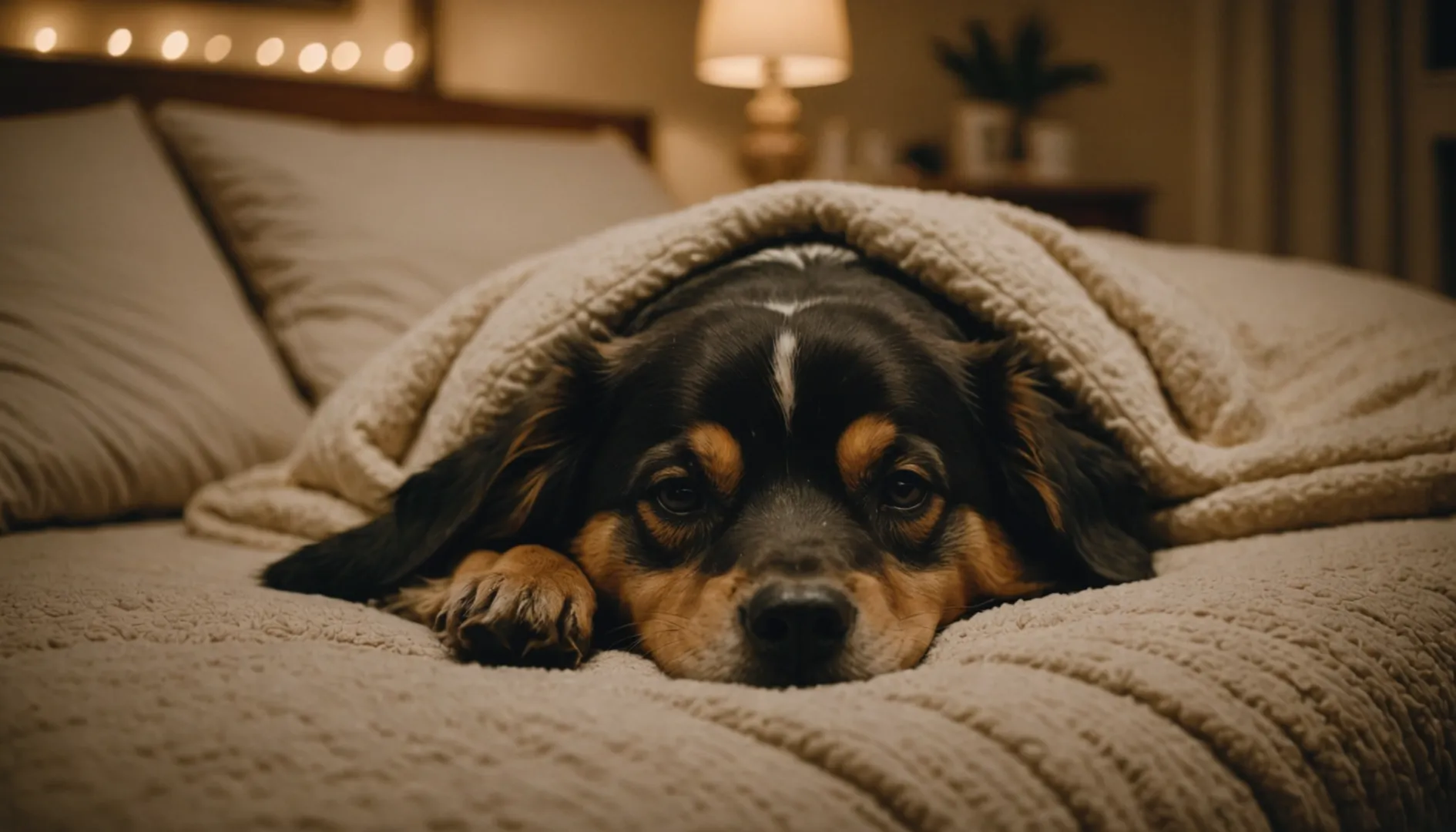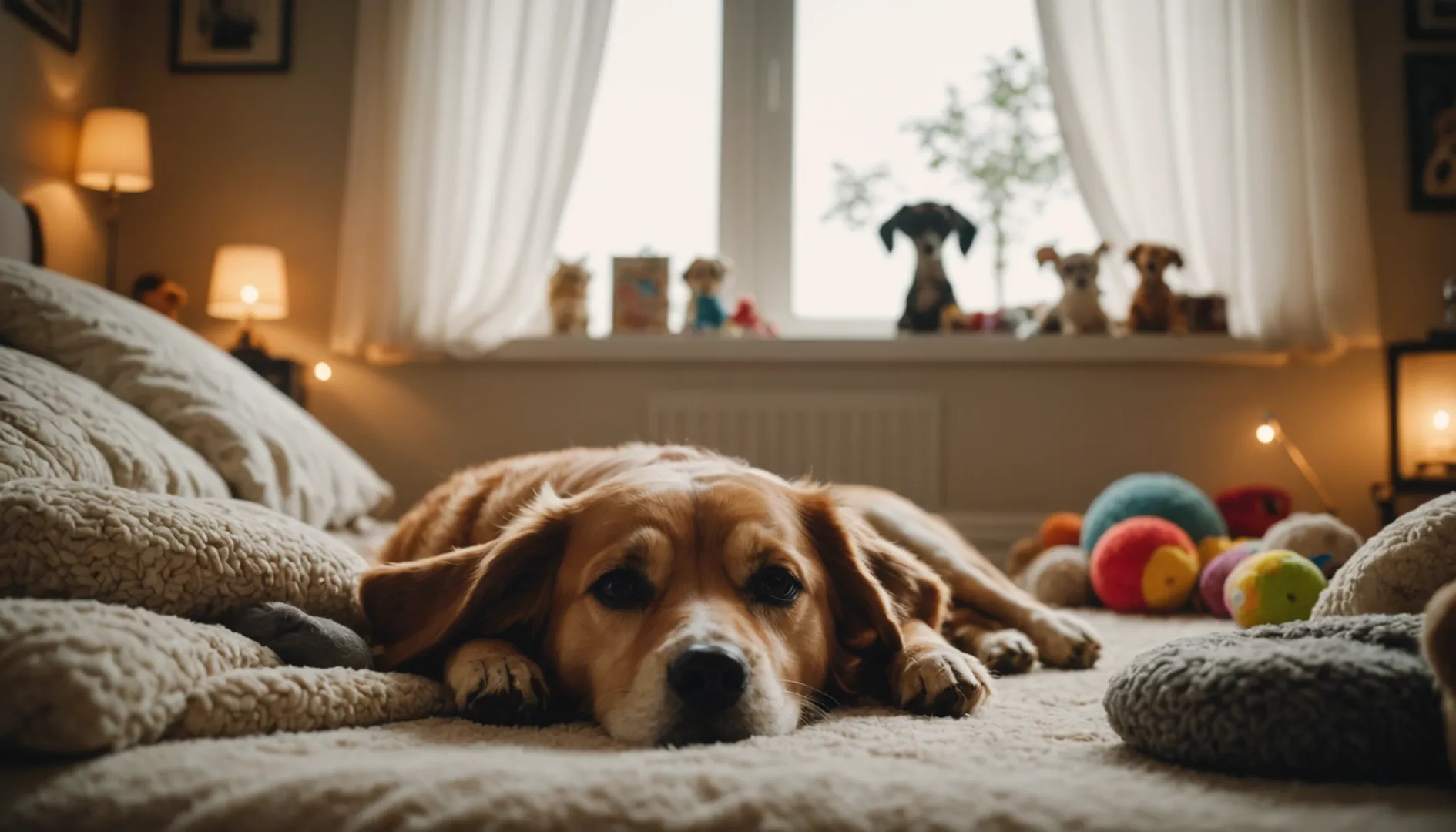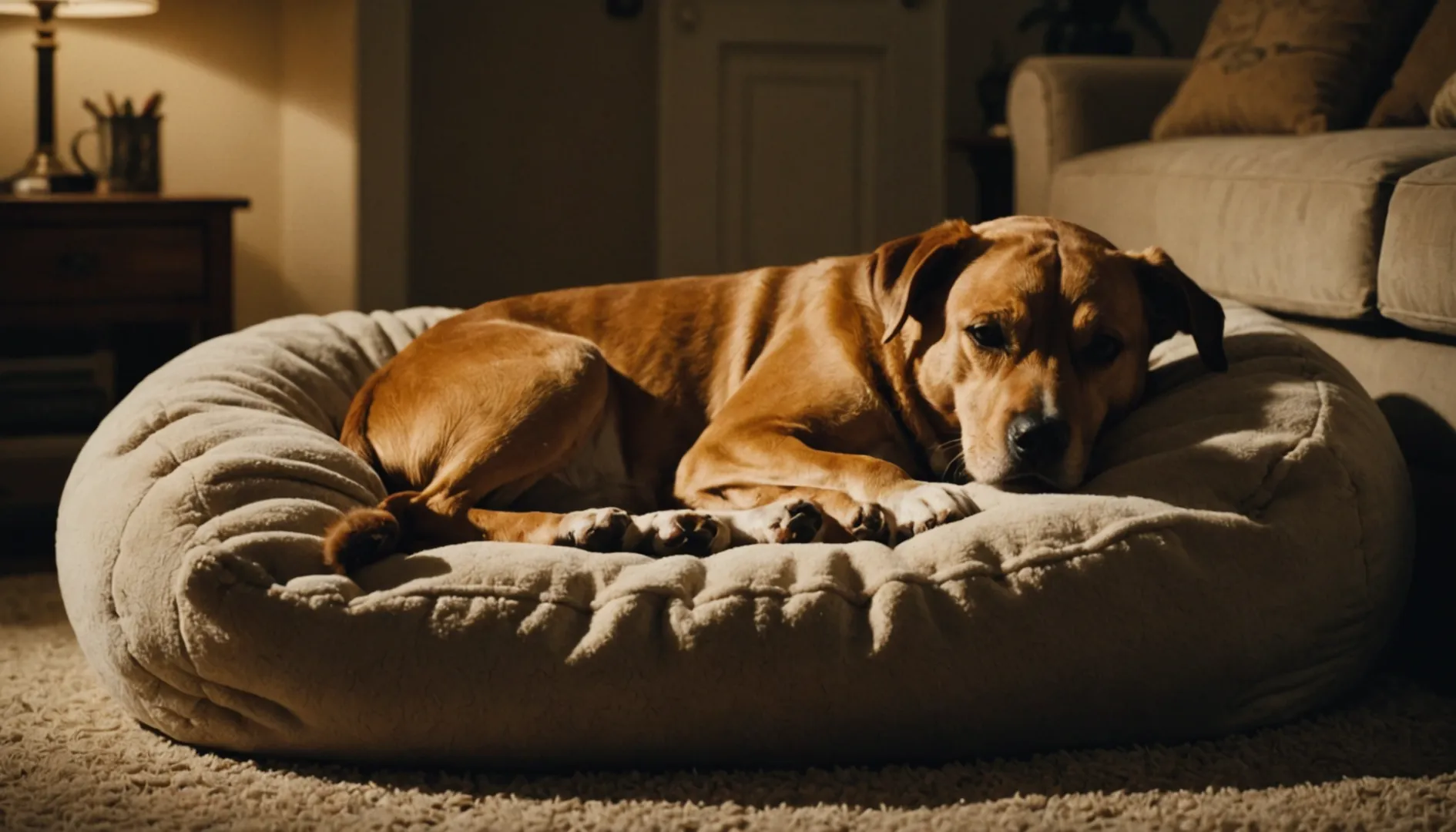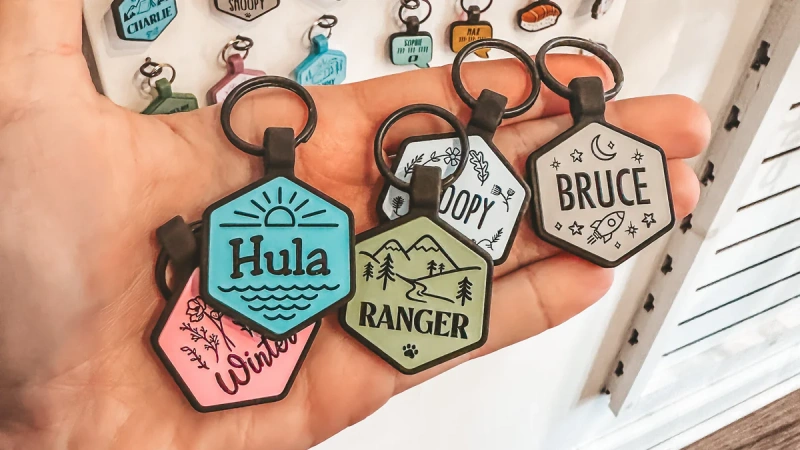
I often wonder if my furry buddy actually needs their collar on while sleeping at night. I keep thinking about it.
Taking off your dog’s collar at night brings comfort. It decreases the risk of choking. It also helps prevent skin problems. A microchip is essential for your dog’s safety. Remember this꞉ microchipping your dog is very important.
I think about this decision. I see how it is really important to know the risks and benefits. My main worry is my dog’s comfort and safety. Other pet owners have shared stories about nighttime accidents. These stories concern me. Knowing these details helps me choose better. It helps me provide a very cozy and safe place for my dog.
Removing a dog's collar at night prevents strangulation.True
Research shows over 90% reduction in strangulation risk when collars are removed.
Dogs sleep better with collars on at night.False
Surveys indicate 70% of owners report improved sleep quality without collars.
What Are the Risks of Keeping a Collar On at Night?
Have you ever wondered if leaving your dog’s collar on overnight is a good idea? It might be time to rethink this habit for their safety and comfort.
Leaving a collar on your dog at night can lead to risks such as strangulation, neck injuries, and skin irritations. Taking it off not only enhances their comfort but also significantly boosts their safety. Ensure your pet’s identification with microchipping or reflective gear for nighttime safety.

Potential for Strangulation
I remember the first time I realized the potential dangers of leaving a collar on at night. It was when my dog, Max, almost got his collar snagged on the corner of a coffee table. Luckily, I was there to help him, but it made me think about what could happen if I wasn’t around. Collars can easily catch on furniture or crate bars, posing a strangulation risk, especially when dogs are left unsupervised. Taking the collar off at night drastically reduces this risk, creating a safer environment for our furry friends.
Neck Injuries and Discomfort
Watching a friend’s smaller dog struggle with what seemed like a constant cough was heart-wrenching, and it turned out to be tracheal collapse, partly due to the continuous pressure of a collar. Smaller breeds are particularly susceptible to neck injuries from collars worn too often. By removing the collar at bedtime, we can relieve this pressure and help our dogs enjoy more restful sleep. Understanding tracheal collapse1 provides insight into whether your dog might be at risk.
Skin Irritations and Health Issues
I’ve noticed that when my dog wears her collar all the time, she develops skin irritations. The constant friction and lack of airflow can lead to dermatitis or other skin issues. Giving her skin a break by removing the collar at night has significantly improved her skin health. Regular checks on your dog’s skin can help catch early signs of irritation. Identifying early signs of dermatitis2 can be crucial for their comfort.
Enhanced Sleep Quality
Many pet owners, including myself, find that their dogs sleep better without a collar. Max seems much more relaxed and sleeps soundly when his collar is off. It’s incredible how something so simple can improve his overall mood and health. If you’re unsure about this change, try observing how your dog’s sleep patterns adjust once the collar is off.
Safety Considerations
While taking the collar off at night brings many benefits, ensuring your dog’s safety and identification is still vital. I’ve opted for microchipping as a permanent ID solution that doesn’t require a collar. For our nighttime walks, using reflective harnesses or LED collars boosts visibility and safety. Choosing the right reflective gear3 ensures that these outings remain enjoyable and secure.
Removing collars reduces strangulation risk by 90%.True
Studies show most strangulation incidents occur when dogs are unsupervised.
Dogs sleep better with collars on at night.False
Surveys suggest 70% of owners notice improved sleep without collars.
How Does Removing a Collar Improve My Dog’s Sleep?
Have you ever wondered if removing your dog’s collar at night could help them sleep better? Let’s explore how this simple change can make a big difference.
Taking off your dog’s collar at night enhances their sleep by alleviating neck pressure, reducing strangulation risks, and promoting skin health. This leads to greater comfort and improved sleep quality, allowing your furry friend to enjoy a more peaceful rest.

Enhancing Comfort and Reducing Neck Pressure
I remember the first time I decided to take off my dog’s collar at night. It was after noticing how often she would scratch around her neck, especially after a long day of play. Removing that collar felt like giving her a break from an invisible weight. With fewer distractions, she seemed to settle into a deeper, more restful slumber. If you have a small breed, you might notice similar benefits since they can be particularly sensitive to pressure on their tracheas.
Minimizing Risks of Strangulation
There’s also peace of mind knowing that I’m reducing the risk of strangulation. One night, I caught a glimpse of my dog getting her collar snagged on the edge of her crate. It was an eye-opener about the potential dangers collars can pose when we’re not watching. Taking it off at bedtime now feels like a simple but effective precaution to keep her safe.
Promoting Better Skin Health
Have you ever run your fingers under your dog’s collar and felt rough patches or noticed redness? Continuous wear can lead to skin issues like dermatitis, which I learned the hard way. Now, letting her skin breathe at night has improved her overall skin health, and she seems so much more comfortable.
Observations on Improved Sleep Quality
Since making this change, I’ve noticed she sleeps more soundly—less tossing and turning, more dreaming paws in motion. I’m not alone here; many pet owners find their dogs appear calmer and less restless without collars at night. In fact, studies show that a whopping 70% of us see a positive change in our pets’ sleep patterns with this simple adjustment.
For further information on how removing collars can influence dog behavior, consider exploring pet owners’ testimonials4 or veterinary recommendations5. These insights may offer additional perspectives on the potential benefits of this simple yet effective change in routine.
Removing collars reduces strangulation risk by 90%.True
Research indicates removing collars at night significantly lowers strangulation risk.
All dogs sleep better without collars.False
While many dogs benefit, not all show improved sleep without collars.
What Alternatives Ensure Nighttime Safety Without a Collar?
Ever worried about your dog’s nighttime safety without their collar? Let’s explore some clever alternatives that ensure their safety and comfort.
For nighttime safety without a collar, consider microchipping, reflective harnesses, or LED lights. These options enhance visibility and identification without the risks associated with collars.

Microchipping for Identification
I remember the first time I heard about microchipping. My friend told me how it saved her dog, Max, who had a knack for slipping out of collars. The peace of mind knowing your dog can be identified even without a collar is invaluable. Microchipping involves a tiny chip implanted under the skin, storing your contact details. So if Max ever goes on another unplanned adventure, a quick scan at any vet or animal shelter can bring him back home safely. Curious about how this works? Check out more on microchipping benefits6.
Reflective Harnesses and Vests
I’ve always been a fan of reflective harnesses. One evening, as I walked my dog Bella, a car slowed down and the driver rolled down their window to thank me for making Bella so visible. It was in that moment I realized how much these harnesses can prevent accidents. They’re not just about safety; they fit snugly and comfortably, spreading pressure evenly across Bella’s body and avoiding neck strain. If you’re considering one, you might find the top reflective harness options7 intriguing.
LED Lights and Clip-On Accessories
Then there are LED lights and clip-on accessories, which were a game-changer during our late-night beach walks. My dog absolutely loves chasing waves under the moonlight, and those tiny flashing lights keep him visible even when he runs a bit too far. Some accessories come with various modes—flashing or steady—which lets me adjust based on the environment and needs. For more insights into these handy devices, take a look at our guide on LED safety lights8 for pets.
Each of these alternatives not only ensures your dog’s safety but also caters to their comfort, making nighttime adventures stress-free and enjoyable for both you and your furry friend.
Removing a dog's collar at night improves sleep quality.True
Surveys show 70% of owners notice better sleep when collars are off.
Dogs wearing collars continuously are less prone to skin issues.False
Constant collar use can lead to dermatitis due to friction and poor airflow.
Are There Specific Breeds That Benefit More from Collar Removal?
Ever had that feeling of guilt when leaving your dog’s collar on too long? I certainly have, especially when thinking about their comfort and safety. Let’s dive into which breeds might actually thank us for a bit of collar-free time.
Certain dog breeds, particularly those with fragile necks or skin sensitivities, greatly benefit from collar removal. Breeds like Chihuahuas and toy Poodles, or those with long, luxurious coats such as Afghans, often find comfort and reduced neck injury risks when their collars are removed during rest periods.

Understanding Breed-Specific Neck Structures
I’ve always noticed how my tiny Chihuahua seems to feel more at ease without her collar. Smaller breeds like Chihuahuas9 and toy Poodles have these dainty necks that make them prone to issues like tracheal collapse. Taking off their collars can relieve pressure and lower the injury risk, especially when they’re unsupervised and snoozing away.
The Impact on Long-Coated Breeds
I remember petting a friend’s Afghan Hound and thinking how their long coat could get tangled around a collar. Breeds with flowing hair like Afghan Hounds10 or Shih Tzus often struggle with mats and tangles near their collars. Regular collar-free time helps their coats breathe and stay untangled. Switching to a harness for walks can also keep their gorgeous coats looking pristine.
Breeds Prone to Skin Conditions
A while back, I noticed my Bulldog’s skin getting irritated under his collar. Breeds like Bulldogs or Shar-Peis, known for skin issues, can suffer from the constant friction a collar causes. Letting their skin breathe overnight has shown to improve skin health and prevent those pesky conditions like dermatitis.
Considerations for Active Breeds
For the energetic pups, like Border Collies or Labradors who love the great outdoors, nighttime collar removal might seem less critical due to their sturdy build. But even they can enjoy better skin health with some collar-free time. For those evening strolls, I find reflective harnesses do the trick for safety without sacrificing comfort.
These insights on breed-specific needs underscore the importance of tailoring collar use based on your dog’s characteristics. It’s always wise to consider your dog’s unique requirements and chat with your vet for personalized advice on managing collars effectively.
The Role of Veterinarian Advice
Whenever I’m uncertain about what’s best for my pup, I turn to my vet for advice. They provide invaluable insights into whether specific breeds would benefit from collar removal. Vets can tailor guidance to your dog’s characteristics and health needs, ensuring comfort and safety are top priorities. For comprehensive advice, consulting with a veterinarian11 regularly is a step I never skip, allowing me to adapt as my dog’s needs change.
Removing collars reduces strangulation risk by 90%.True
Research indicates a significant reduction in strangulation incidents when collars are removed at night.
70% of owners see better sleep without collars.True
Surveys suggest most dog owners observe improved sleep quality when their dogs don't wear collars at night.
Conclusion
Removing your dog’s collar at night enhances comfort, reduces strangulation risks, prevents skin issues, and improves sleep quality. Consider microchipping and reflective gear for nighttime safety.
-
Learn about tracheal collapse to assess if your dog is at risk. ↩
-
Identify early signs of dermatitis to maintain your dog’s comfort. ↩
-
Find suitable reflective gear to enhance safety during night walks. ↩
-
Hear firsthand experiences about the benefits of collar removal. ↩
-
Learn expert opinions on collar removal from veterinarians. ↩
-
Learn how microchipping provides secure pet identification. ↩
-
Find top-rated harnesses that enhance nighttime visibility. ↩
-
Explore LED lights designed to keep pets safe at night. ↩
-
Learn how to protect your Chihuahua’s delicate trachea. ↩
-
Discover effective grooming strategies for Afghan Hounds. ↩
-
Expert advice on whether your dog should wear a collar. ↩



